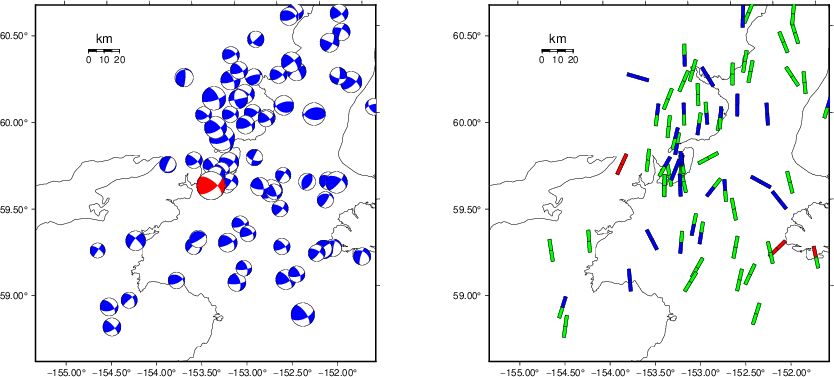Location
Location ANSS
The ANSS event ID is ak01613v15nv and the event page is at
https://earthquake.usgs.gov/earthquakes/eventpage/ak01613v15nv/executive.
2016/01/24 10:30:30 59.620 -153.339 125.6 7.1 Alaska
Focal Mechanism
USGS/SLU Moment Tensor Solution
ENS 2016/01/24 10:30:30:0 59.62 -153.34 125.6 7.1 Alaska
Stations used:
AK.CAST AK.DIV AK.KTH AK.MCK AK.PPLA AT.OHAK AT.PMR AT.TTA
II.KDAK TA.L19K TA.N19K TA.O18K TA.O19K TA.P18K
Filtering commands used:
cut o DIST/3.3 -60 o DIST/3.3 +180
rtr
taper w 0.1
hp c 0.01 n 3
lp c 0.025 n 3
Best Fitting Double Couple
Mo = 4.42e+26 dyne-cm
Mw = 7.03
Z = 114 km
Plane Strike Dip Rake
NP1 55 65 30
NP2 311 63 152
Principal Axes:
Axis Value Plunge Azimuth
T 4.42e+26 38 274
N 0.00e+00 52 91
P -4.42e+26 1 183
Moment Tensor: (dyne-cm)
Component Value
Mxx -4.39e+26
Mxy -3.91e+25
Mxz 2.36e+25
Myy 2.70e+26
Myz -2.14e+26
Mzz 1.69e+26
--------------
----------------------
----------------------------
------------------------------
###########-----------------------
###############--------------------#
###################----------------###
#######################------------#####
#########################---------######
####### ##################-----#########
####### T ####################--##########
####### ####################-###########
############################-----#########
########################---------#######
######################------------######
##################---------------#####
############---------------------###
-##-----------------------------##
------------------------------
----------------------------
--------- ----------
----- P ------
Global CMT Convention Moment Tensor:
R T P
1.69e+26 2.36e+25 2.14e+26
2.36e+25 -4.39e+26 3.91e+25
2.14e+26 3.91e+25 2.70e+26
Details of the solution is found at
http://www.eas.slu.edu/eqc/eqc_mt/MECH.NA/20160124103030/index.html
|
Preferred Solution
The preferred solution from an analysis of the surface-wave spectral amplitude radiation pattern, waveform inversion or first motion observations is
STK = 55
DIP = 65
RAKE = 30
MW = 7.03
HS = 114.0
The NDK file is 20160124103030.ndk
The waveform inversion is preferred.
Moment Tensor Comparison
The following compares this source inversion to those provided by others. The purpose is to look for major differences and also to note slight differences that might be inherent to the processing procedure. For completeness the USGS/SLU solution is repeated from above.
| SLU |
USGSMT |
USGSW |
USGS/SLU Moment Tensor Solution
ENS 2016/01/24 10:30:30:0 59.62 -153.34 125.6 7.1 Alaska
Stations used:
AK.CAST AK.DIV AK.KTH AK.MCK AK.PPLA AT.OHAK AT.PMR AT.TTA
II.KDAK TA.L19K TA.N19K TA.O18K TA.O19K TA.P18K
Filtering commands used:
cut o DIST/3.3 -60 o DIST/3.3 +180
rtr
taper w 0.1
hp c 0.01 n 3
lp c 0.025 n 3
Best Fitting Double Couple
Mo = 4.42e+26 dyne-cm
Mw = 7.03
Z = 114 km
Plane Strike Dip Rake
NP1 55 65 30
NP2 311 63 152
Principal Axes:
Axis Value Plunge Azimuth
T 4.42e+26 38 274
N 0.00e+00 52 91
P -4.42e+26 1 183
Moment Tensor: (dyne-cm)
Component Value
Mxx -4.39e+26
Mxy -3.91e+25
Mxz 2.36e+25
Myy 2.70e+26
Myz -2.14e+26
Mzz 1.69e+26
--------------
----------------------
----------------------------
------------------------------
###########-----------------------
###############--------------------#
###################----------------###
#######################------------#####
#########################---------######
####### ##################-----#########
####### T ####################--##########
####### ####################-###########
############################-----#########
########################---------#######
######################------------######
##################---------------#####
############---------------------###
-##-----------------------------##
------------------------------
----------------------------
--------- ----------
----- P ------
Global CMT Convention Moment Tensor:
R T P
1.69e+26 2.36e+25 2.14e+26
2.36e+25 -4.39e+26 3.91e+25
2.14e+26 3.91e+25 2.70e+26
Details of the solution is found at
http://www.eas.slu.edu/eqc/eqc_mt/MECH.NA/20160124103030/index.html
|
Body-wave Moment Tensor (Mwb)
Moment 3.867e+19 N-m
Magnitude 6.99
Depth 117.0 km
Percent DC 60%
Half Duration –
Catalog US (us10004gqp)
Data Source US3
Contributor US3
Nodal Planes
Plane Strike Dip Rake
NP1 302 50 153
NP2 50 70 43
Principal Axes
Axis Value Plunge Azimuth
T 4.217 45 274
N -0.837 43 70
P -3.381 12 172

|
W-phase Moment Tensor (Mww)
Moment 6.005e+19 N-m
Magnitude 7.12
Depth 110.5 km
Percent DC 98%
Half Duration –
Catalog US (us10004gqp)
Data Source US3
Contributor US3
Nodal Planes
Plane Strike Dip Rake
NP1 313 61 152
NP2 58 66 33
Principal Axes
Axis Value Plunge Azimuth
T 5.979 40 277
N 0.050 50 91
P -6.030 3 185

|
Magnitudes
Given the availability of digital waveforms for determination of the moment tensor, this section documents the added processing leading to mLg, if appropriate to the region, and ML by application of the respective IASPEI formulae. As a research study, the linear distance term of the IASPEI formula
for ML is adjusted to remove a linear distance trend in residuals to give a regionally defined ML. The defined ML uses horizontal component recordings, but the same procedure is applied to the vertical components since there may be some interest in vertical component ground motions. Residual plots versus distance may indicate interesting features of ground motion scaling in some distance ranges. A residual plot of the regionalized magnitude is given as a function of distance and azimuth, since data sets may transcend different wave propagation provinces.
ML Magnitude

Left: ML computed using the IASPEI formula for Horizontal components. Center: ML residuals computed using a modified IASPEI formula that accounts for path specific attenuation; the values used for the trimmed mean are indicated. The ML relation used for each figure is given at the bottom of each plot.
Right: Residuals from new relation as a function of distance and azimuth.

Left: ML computed using the IASPEI formula for Vertical components (research). Center: ML residuals computed using a modified IASPEI formula that accounts for path specific attenuation; the values used for the trimmed mean are indicated. The ML relation used for each figure is given at the bottom of each plot.
Right: Residuals from new relation as a function of distance and azimuth.
Context
The left panel of the next figure presents the focal mechanism for this earthquake (red) in the context of other nearby events (blue) in the SLU Moment Tensor Catalog. The right panel shows the inferred direction of maximum compressive stress and the type of faulting (green is strike-slip, red is normal, blue is thrust; oblique is shown by a combination of colors). Thus context plot is useful for assessing the appropriateness of the moment tensor of this event.
Waveform Inversion using wvfgrd96
The focal mechanism was determined using broadband seismic waveforms. The location of the event (star) and the
stations used for (red) the waveform inversion are shown in the next figure.
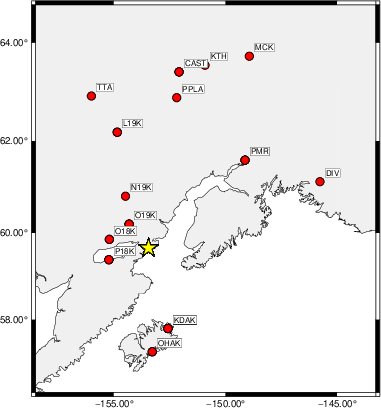
|
|
Location of broadband stations used for waveform inversion
|
The program wvfgrd96 was used with good traces observed at short distance to determine the focal mechanism, depth and seismic moment. This technique requires a high quality signal and well determined velocity model for the Green's functions. To the extent that these are the quality data, this type of mechanism should be preferred over the radiation pattern technique which requires the separate step of defining the pressure and tension quadrants and the correct strike.
The observed and predicted traces are filtered using the following gsac commands:
cut o DIST/3.3 -60 o DIST/3.3 +180
rtr
taper w 0.1
hp c 0.01 n 3
lp c 0.025 n 3
The results of this grid search are as follow:
DEPTH STK DIP RAKE MW FIT
WVFGRD96 2.0 110 40 -70 6.27 0.1895
WVFGRD96 4.0 100 40 -85 6.35 0.2190
WVFGRD96 6.0 110 45 -65 6.38 0.2218
WVFGRD96 8.0 105 45 -75 6.43 0.2338
WVFGRD96 10.0 105 40 -70 6.43 0.2129
WVFGRD96 12.0 110 40 -65 6.42 0.1842
WVFGRD96 14.0 270 85 -55 6.37 0.1723
WVFGRD96 16.0 270 85 -55 6.38 0.1829
WVFGRD96 18.0 90 90 50 6.38 0.1887
WVFGRD96 20.0 265 80 -55 6.40 0.2028
WVFGRD96 22.0 265 80 -55 6.41 0.2137
WVFGRD96 24.0 265 80 -55 6.43 0.2249
WVFGRD96 26.0 265 80 -50 6.43 0.2354
WVFGRD96 28.0 265 80 -50 6.45 0.2472
WVFGRD96 30.0 265 80 -50 6.46 0.2585
WVFGRD96 32.0 265 80 -50 6.47 0.2686
WVFGRD96 34.0 265 80 -45 6.49 0.2791
WVFGRD96 36.0 260 75 -45 6.50 0.2887
WVFGRD96 38.0 260 75 -40 6.51 0.2974
WVFGRD96 40.0 260 75 -55 6.60 0.2990
WVFGRD96 42.0 260 75 -55 6.61 0.3052
WVFGRD96 44.0 260 75 -50 6.62 0.3107
WVFGRD96 46.0 260 75 -50 6.62 0.3155
WVFGRD96 48.0 260 75 -50 6.63 0.3189
WVFGRD96 50.0 260 75 -50 6.64 0.3210
WVFGRD96 52.0 255 75 -45 6.64 0.3229
WVFGRD96 54.0 255 75 -50 6.64 0.3245
WVFGRD96 56.0 255 75 -40 6.65 0.3289
WVFGRD96 58.0 250 75 -45 6.65 0.3366
WVFGRD96 60.0 80 50 70 6.76 0.3523
WVFGRD96 62.0 75 55 65 6.77 0.3742
WVFGRD96 64.0 75 55 65 6.79 0.3999
WVFGRD96 66.0 65 55 50 6.81 0.4274
WVFGRD96 68.0 65 55 50 6.83 0.4561
WVFGRD96 70.0 65 55 50 6.84 0.4842
WVFGRD96 72.0 65 55 50 6.86 0.5110
WVFGRD96 74.0 65 55 50 6.87 0.5363
WVFGRD96 76.0 65 55 50 6.89 0.5597
WVFGRD96 78.0 60 60 40 6.89 0.5862
WVFGRD96 80.0 60 60 40 6.90 0.6121
WVFGRD96 82.0 60 60 40 6.92 0.6361
WVFGRD96 84.0 60 60 40 6.93 0.6581
WVFGRD96 86.0 60 60 40 6.94 0.6778
WVFGRD96 88.0 60 60 40 6.95 0.6948
WVFGRD96 90.0 60 60 40 6.96 0.7093
WVFGRD96 92.0 60 60 40 6.97 0.7220
WVFGRD96 94.0 60 65 40 6.97 0.7343
WVFGRD96 96.0 60 65 40 6.98 0.7455
WVFGRD96 98.0 60 65 40 6.98 0.7553
WVFGRD96 100.0 60 65 40 6.99 0.7634
WVFGRD96 102.0 60 65 35 7.00 0.7721
WVFGRD96 104.0 60 65 35 7.01 0.7792
WVFGRD96 106.0 60 65 35 7.01 0.7842
WVFGRD96 108.0 60 65 35 7.02 0.7873
WVFGRD96 110.0 60 65 35 7.02 0.7885
WVFGRD96 112.0 55 65 30 7.03 0.7908
WVFGRD96 114.0 55 65 30 7.03 0.7913
WVFGRD96 116.0 55 70 30 7.03 0.7911
WVFGRD96 118.0 55 70 30 7.03 0.7912
WVFGRD96 120.0 55 70 30 7.04 0.7898
WVFGRD96 122.0 55 70 30 7.04 0.7871
WVFGRD96 124.0 55 70 30 7.04 0.7833
WVFGRD96 126.0 55 70 30 7.04 0.7786
WVFGRD96 128.0 55 70 30 7.05 0.7730
WVFGRD96 130.0 50 70 25 7.05 0.7684
WVFGRD96 132.0 50 70 25 7.06 0.7645
WVFGRD96 134.0 50 70 25 7.06 0.7599
WVFGRD96 136.0 50 70 25 7.06 0.7546
WVFGRD96 138.0 50 75 25 7.05 0.7500
The best solution is
WVFGRD96 114.0 55 65 30 7.03 0.7913
The mechanism corresponding to the best fit is
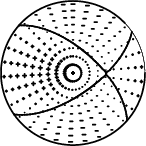
|
|
Figure 1. Waveform inversion focal mechanism
|
The best fit as a function of depth is given in the following figure:
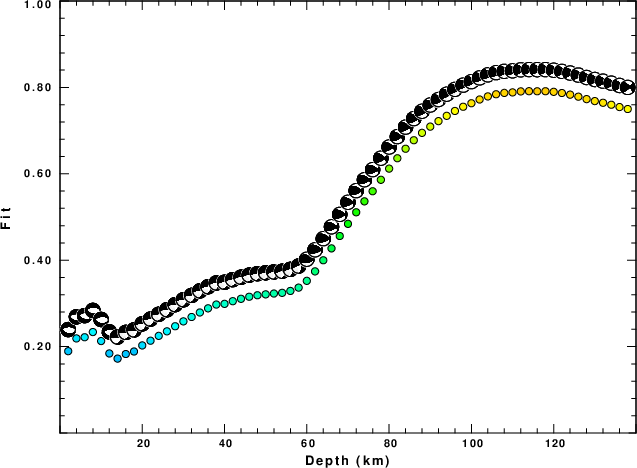
|
|
Figure 2. Depth sensitivity for waveform mechanism
|
The comparison of the observed and predicted waveforms is given in the next figure. The red traces are the observed and the blue are the predicted.
Each observed-predicted component is plotted to the same scale and peak amplitudes are indicated by the numbers to the left of each trace. A pair of numbers is given in black at the right of each predicted traces. The upper number it the time shift required for maximum correlation between the observed and predicted traces. This time shift is required because the synthetics are not computed at exactly the same distance as the observed, the velocity model used in the predictions may not be perfect and the epicentral parameters may be be off.
A positive time shift indicates that the prediction is too fast and should be delayed to match the observed trace (shift to the right in this figure). A negative value indicates that the prediction is too slow. The lower number gives the percentage of variance reduction to characterize the individual goodness of fit (100% indicates a perfect fit).
The bandpass filter used in the processing and for the display was
cut o DIST/3.3 -60 o DIST/3.3 +180
rtr
taper w 0.1
hp c 0.01 n 3
lp c 0.025 n 3
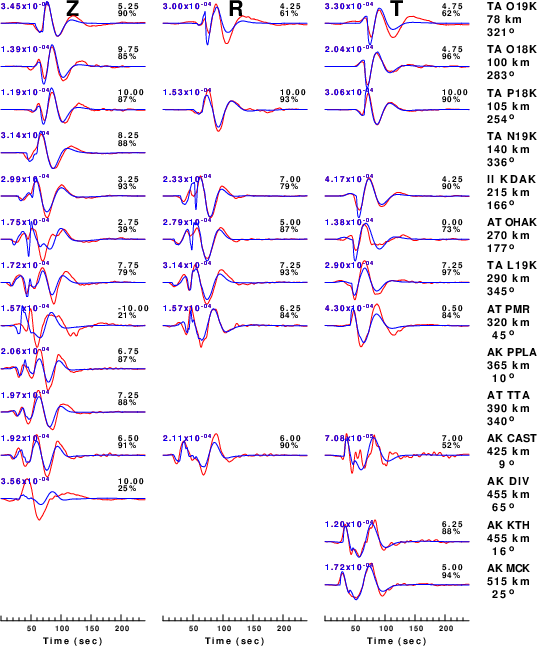
|
|
Figure 3. Waveform comparison for selected depth. Red: observed; Blue - predicted. The time shift with respect to the model prediction is indicated. The percent of fit is also indicated. The time scale is relative to the first trace sample.
|
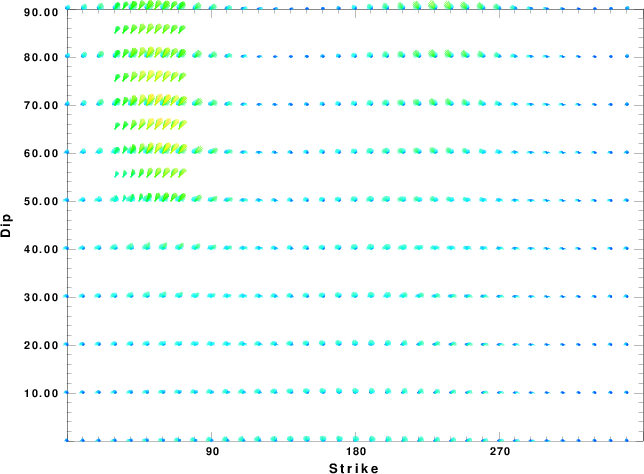
|
|
Focal mechanism sensitivity at the preferred depth. The red color indicates a very good fit to the waveforms.
Each solution is plotted as a vector at a given value of strike and dip with the angle of the vector representing the rake angle, measured, with respect to the upward vertical (N) in the figure.
|
A check on the assumed source location is possible by looking at the time shifts between the observed and predicted traces. The time shifts for waveform matching arise for several reasons:
- The origin time and epicentral distance are incorrect
- The velocity model used for the inversion is incorrect
- The velocity model used to define the P-arrival time is not the
same as the velocity model used for the waveform inversion
(assuming that the initial trace alignment is based on the
P arrival time)
Assuming only a mislocation, the time shifts are fit to a functional form:
Time_shift = A + B cos Azimuth + C Sin Azimuth
The time shifts for this inversion lead to the next figure:
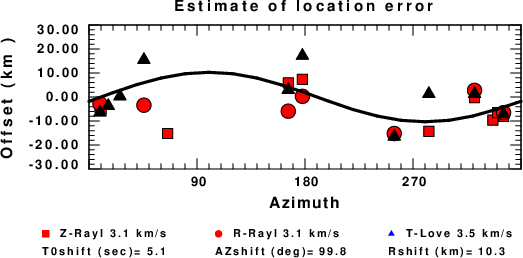
The derived shift in origin time and epicentral coordinates are given at the bottom of the figure.
Velocity Model
The WUS.model used for the waveform synthetic seismograms and for the surface wave eigenfunctions and dispersion is as follows
(The format is in the model96 format of Computer Programs in Seismology).
MODEL.01
Model after 8 iterations
ISOTROPIC
KGS
FLAT EARTH
1-D
CONSTANT VELOCITY
LINE08
LINE09
LINE10
LINE11
H(KM) VP(KM/S) VS(KM/S) RHO(GM/CC) QP QS ETAP ETAS FREFP FREFS
1.9000 3.4065 2.0089 2.2150 0.302E-02 0.679E-02 0.00 0.00 1.00 1.00
6.1000 5.5445 3.2953 2.6089 0.349E-02 0.784E-02 0.00 0.00 1.00 1.00
13.0000 6.2708 3.7396 2.7812 0.212E-02 0.476E-02 0.00 0.00 1.00 1.00
19.0000 6.4075 3.7680 2.8223 0.111E-02 0.249E-02 0.00 0.00 1.00 1.00
0.0000 7.9000 4.6200 3.2760 0.164E-10 0.370E-10 0.00 0.00 1.00 1.00
Last Changed Fri Apr 26 01:22:26 PM CDT 2024




